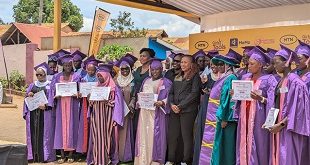
Kitgum, Uganda | THE INDEPENDENT | Agro-input dealers in Kitgum district have realized a sharp rise in sales of seeds and farm implements during the COVID-19 lockdown.
This comes as the majority of the community members have turned to subsistence and commercial agriculture as they utilize the lockdown period.
Gertrude Oola, one of the input dealers at Shawa Agro-input dealers and general distribution says sales of farm implements such as hand hoes and gumboots have been on the rise this farming season unlike last year.
She notes that from her sales, many households took the opportunity to plant crops during the lockdown which saw majority urban dwellers relocate to rural areas.
Oola says that she has been able to sell 209 gumboots between March and April alone compared to only 50 gumboots she sold the whole of last year. She also sold a total of 534 hand hoes between the same months compared to only 120 hoses she sold last year.
Dickens Rackara, the Executive Director of Pur Ber Agro farm and investment Ltd in Kitgum Municipality, says the lockdown has presented a perfect business opportunity for him in the last two months.
He notes that unlike other farming seasons, this time around he made great sales in seeds and farm implements as locals turned to farming as an alternative means of survival.
Rackrara says improved maize, groundnuts and beans seeds have been on high demand by farmers this first farming season.
He, however notes that despite the high demands of agricultural inputs, their challenge has been limited supplies from suppliers coupled with the high cost of transport.
Charles Obong Okwera, the Madi-opei sub-county LCIII chairperson says that there is a likely hood of increased food security this year owing to increased agricultural engagement by locals.
Agriculture remains one of the core sectors of the country’s economy employing about 60 percent of the population.
******
URN
 The Independent Uganda: You get the Truth we Pay the Price
The Independent Uganda: You get the Truth we Pay the Price


